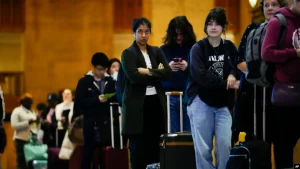The increase in late holiday travelers is gaining momentum, with millions planning to embark on Thanksgiving road trips across the United States.
Airline officials express confidence in avoiding significant disruptions, drawing from lessons learned from past holiday seasons, such as the Southwest Airlines meltdown during the previous Christmas. However, adverse weather conditions, including heavy rain and snow showers along the East Coast, raise a potential threat, with the National Weather Service forecasting accumulating snow in northern New England and the northern Rocky Mountains.

As of 25th November, Wednesday morning, U.S. airports reported only nine flight cancellations and 260 flight delays. Airlines, having increased their workforce and invested in winter equipment, aim to ensure smoother operations, even in sub-freezing temperatures.
Despite these efforts, lengthy security lines are expected due to the holiday crowds. Delta Air Lines advises passengers to arrive at least two hours before domestic flights and three hours early for international flights, with potential variations on Sunday and Monday.
The Transportation Security Administration expects to screen 2.7 million passengers on Wednesday, and a record-breaking 2.9 million on Sunday. However, this surge in holiday travel will also challenge the Federal Aviation Administration, which has faced air traffic controller shortages that led to flight reductions in the New York City area earlier this year.
U.S. Transportation Secretary Pete Buttigieg has assured that the government has taken measures to address holiday travel challenges, including hiring more air traffic controllers, opening new air routes, and providing grants for snowplows and deicing equipment.
AAA predicts that approximately 55.4 million people will travel at least 50 miles from home between Wednesday and Sunday, marking the third-highest forecast ever. Of these, the majority, around 49.1 million, are expected to travel by car.
Gasoline prices offer relief to drivers compared to the previous year, with the nationwide average at $3.28 per gallon, down from $3.63. Air travelers also benefit from lower airfares, down 13% in October, and Thanksgiving fares approximately 14% lower than the previous year, according to government figures and the travel site Hopper.
Despite these savings, some individuals find the high costs of essentials, including rent, food, and healthcare, impacting their travel plans. However, various factors, such as credit card points, help mitigate expenses for certain travelers, emphasizing the diverse financial considerations influencing holiday travel decisions.
